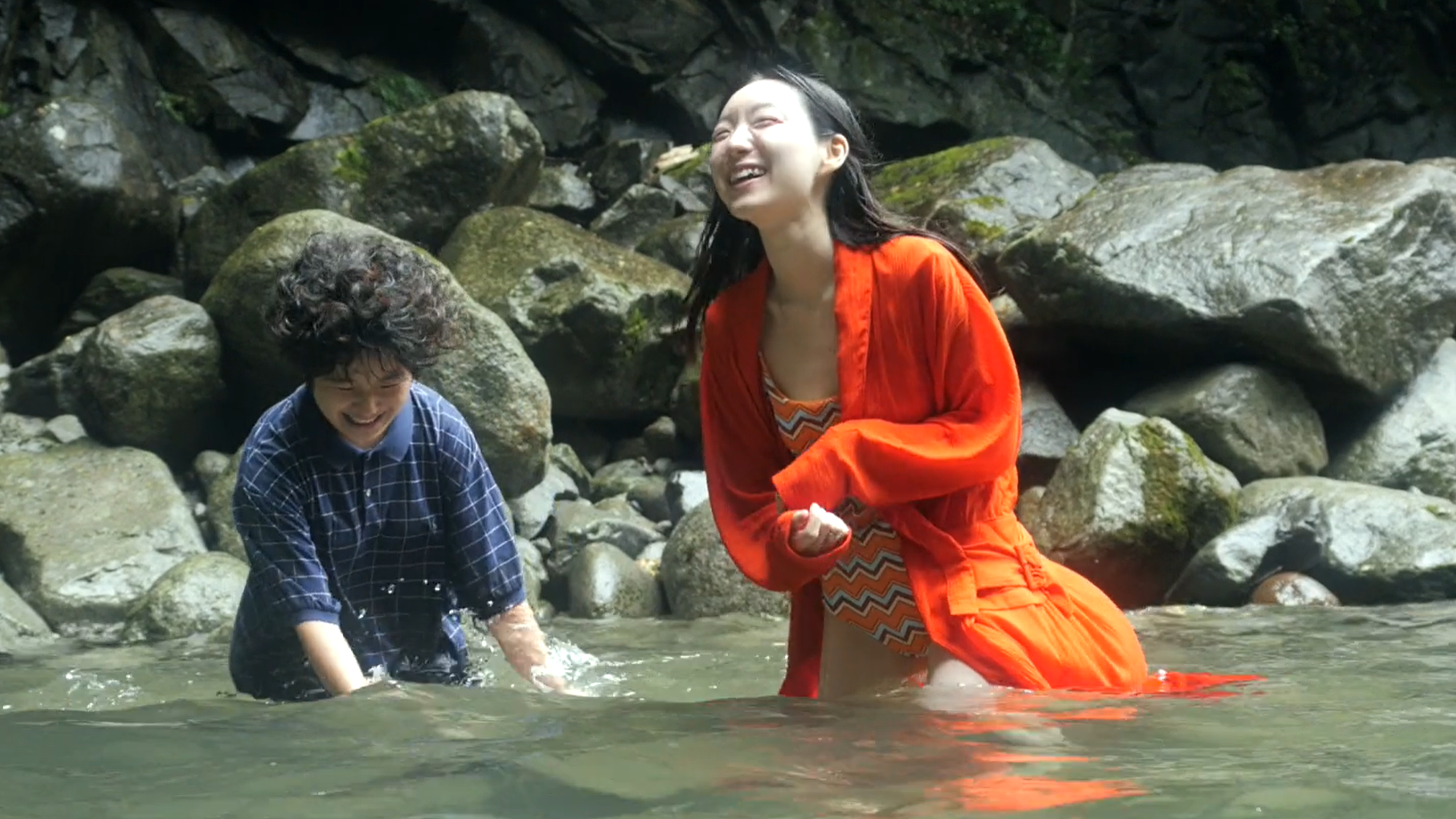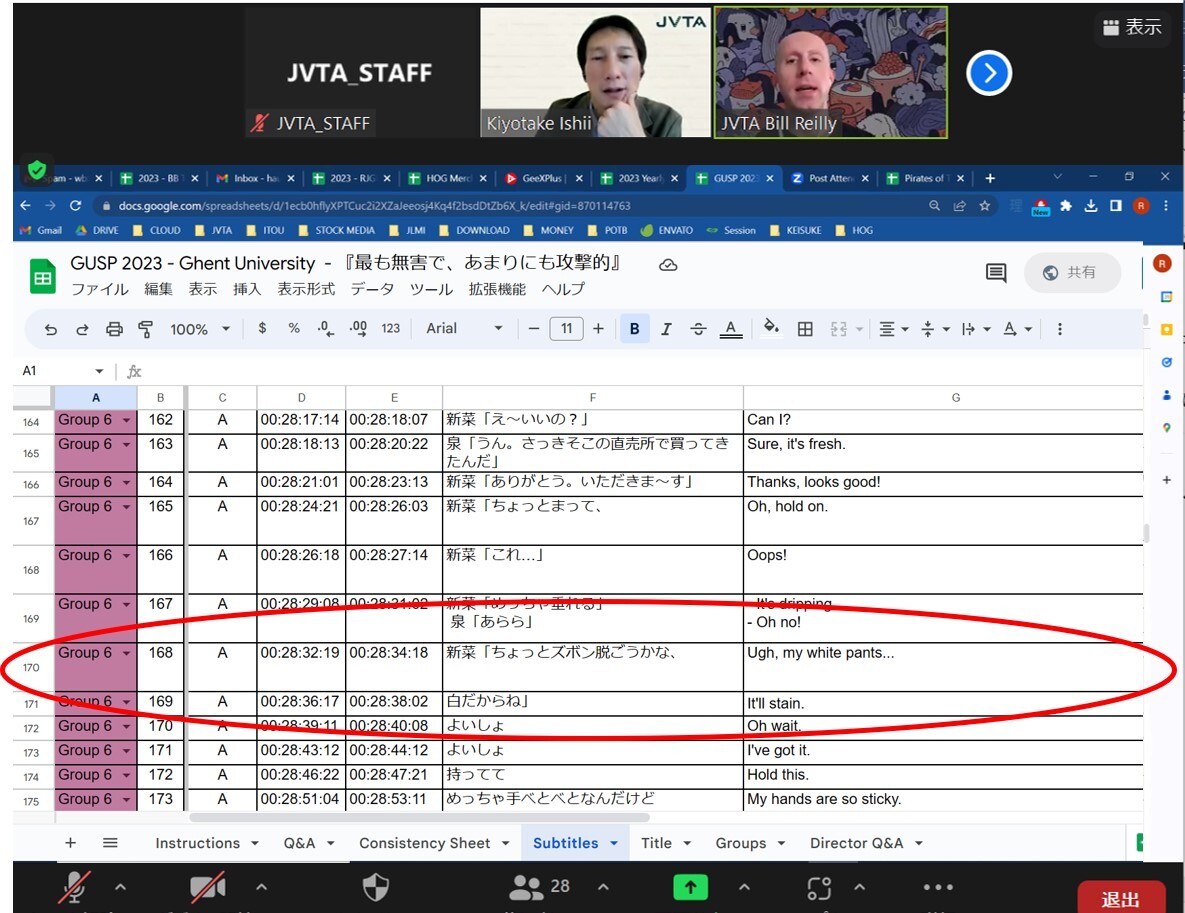In March 2023, the Global Universities Subtitling Project (GUSP) kicked off its online classes with Ghent University in Belgium. GUSP is a collaboration between Japan Visualmedia Translation Academy and various universities outside of Japan. This iteration of GUSP is the seventh time that JVTA has collaborated with Ghent University.
The film translated by students this time was Director Ere Nakada's EXPOSURE, or Mottomo Mugai de Amarinimo Kougekiteki (lit. The Most Harmless yet Hostile). 32 students who are studying the Japanese language and culture at Ghent University and who have N2/N3 level Japanese took on the task of creating English subtitles for this 40-minute Japanese film.

A Scene from EXPOSURE
Left: The Protagonist, Kaho Right: Kaho's love interest, Niina
The class was conducted in a classroom in Ghent with the JVTA instructors teaching remotely. Students gathered in a classroom to learn the intricacies of English subtitling from JVTA's Kiyotake Ishii and Bill Reilly, who were located across the world. Since the foundation of this project in 2016, the lectures have been conducted using this hybrid format every time. Students screen share a spreadsheet with their translation assignment with Kiyotake and Bill, who give feedback on them through interactive discussion.
In visual media translation, it is vital to read into why did a character says a specific line. The film's premise is as follows. The protagonist, Kaho, is a high schooler questioning their gender. She meets an eccentric girl, Niina, during a stay at the family vacation home, and the two grow close.
In the middle of the movie, there is a scene where Kaho, who loves photography, is taking pictures of Niina by a river. A friend of Niina, Izumi, is there to watch. During the shoot, Izumi hands Niina a fruit as a prop, and Niina bites into it. What follows are these lines.
Lines from the scene: (direct translation)
Niina: "Hold on… This is dripping everywhere."
Izumi: "Uh-oh."
Niina: "I think I'll take off my pants since they're white."
In the second class, the students translated the third line above as "I'll take off my pants." Kiyotake then asked, "Why did Niina take off her pants in the first place?" After rewatching the scene, the students answered, "Because the fruit juices would have stained them." Once he saw the students understood the situation, Kiyotake gave the following advice.
"For this line, the point is not to translate the words ‘I want to take off my pants,' but to translate the emotion of ‘I don't want my pants to stain' into natural sounding English. By reading into what the character actually wants to convey, you can find different approaches to translating a line. Think more creatively."
With this in mind, Bill and the students devised new ideas for that line. By the third class, updated the subtitle to the following:
Direct translations don't become good subtitles. Understanding what that character is doing, where they are, and why they say their lines is critical. The students learned that through thorough comprehension of the scene, translators can create subtitles that convey what that character intends to say.
Besides this one scene, the class discussed other lines. Questions like "What is the emotion behind the word "suteki" (wonderful)?" and "To whom is the mother's line directed? Kaho or the father?" were directed to the students as they watched the film. Under Bill's teachings on English writing and Kiyotake's lecture on Japanese language nuance, the students worked as a team to find the most appropriate translations for this film.
Toward the end of the class, the film director, Ere Nakada, joined the online discussion as a guest and spoke with the class.
One student told the director, "I felt this movie had several hidden meanings." They followed with a question regarding the photoshoot scene. "After Kaho finished taking pictures of Niina, they left on their bike as though they were running from Niina. Why is that?"
Nakada answered, "Kaho fled on their bike after taking pictures of Niina that sexualized her. In Japan, such pictures are sold to men and prompt them to view women as sexual objects. Although Kaho was against such practices, they were angry at themselves for joining that discourse and taking pictures of Niina that sexualized her."
To the question "What do you think is the highlight of the film?", Nakada responded with the following: "Anyone who is skeptic of how women are portrayed in media can watch this movie with peace of mind." Nakada has had multiple experiences seeing how woman and girls are portrayed in Japanese films and feeling uncomfortable, asking herself, "is it really okay to represent women like this?" Nakada aimed to make a film that, while mainly set to be viewed in Japan, she believes can appeal to those who don't like common media depictions of women."
Students asked questions mainly in English, but some students tried their hand at asking questions in Japanese. Questions asked included "Where did the inspiration for this film come from?" and "Have you ever imagined what happens after the end of this film?" There was also a question about social issues derived from the film's theme, which was: "What do you think about the issue of gender in Japanese society today?"
Even professional film translators rarely have the opportunity to speak directly with the filmmakers themselves, so the students took this opportunity to ask the director in-depth questions about the film. Nakada kindly answered them all in detail in a simple way that was easy for the students to understand.
Through this valuable session with the director, the students were able to further deepen their understanding of the film - an experience that will surely have a positive impact on the subtitling process. The subtitles will be screened at Nippon Connection, one of the world's largest Japanese film festivals, in Germany in June 2023. The day when the students will be able to unveil this film to the world with subtitles is fast approaching.
Message from Director Ere Nakada
When I write my scripts, I often use restricting phrases to express feelings that are difficult to put into words, so when I was asked about using my film for this project, I was a little worried about whether it would really be useful, especially with so few lines. However, when I saw the completed subtitles, I think I was able to experience just how deep subtitle translation is because of the limited amount of dialogue. For example, in the scene where Kaho is photographing Niina, there is a line where Niina says "nanka ii ne" (how nice) and "suteki" (wonderful). I took the word "suteki" to mean "you look pretty" as an expression that shows Niina's affection for Kaho, but the students at Ghent University translated it as "talented". I think this was done in consideration of the line "You'll never be able to take anything but shabby pictures" that Kaho's mother says to her in a later scene. This allowed me to think about the film from a new perspective.
During the session with the students, I was also impressed by the number of questions they asked about being queer in Japan, and about the gender gap in Japan. I was very happy to be able to talk about these issues, as it's impossible to leave out discussions about representation of certain minorities and social issues when talking about this film.


